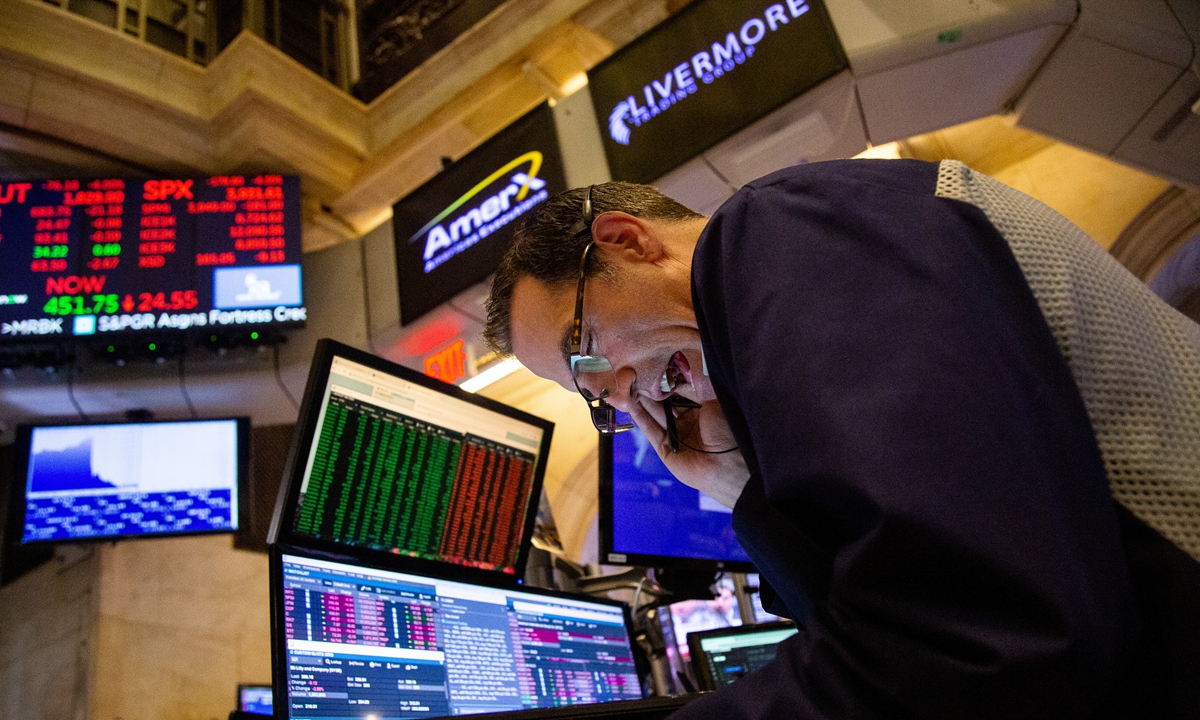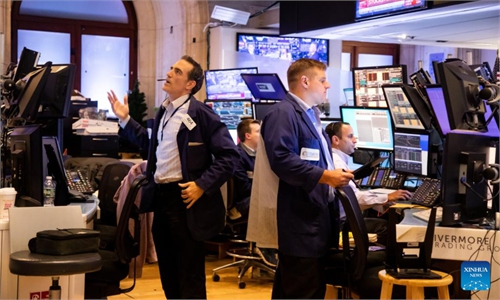Elevated US inflation detonates Wall Street, global markets, ‘may cripple Biden and Democrats’ midterm election prospects’

A trader works on the floor of the New York Stock Exchange (NYSE) in New York on local time September 13, 2022 as higher-than-expected inflation caused capital markets to dive. Photo: Xinhua
As the US and global capital markets dived following the release of higher-than-expected August inflation data in the US, which also triggered anticipation of more interest rate hikes from the US Federal Reserve, analysts said elevated prices would likely "strike a huge blow" to the Biden administration and Democrats ahead of the upcoming US midterm elections, while the administration's efforts like the Chips and Science Act or infrastructure buildup may disintegrate.
Although a rate adjustment could trigger a wave of capital flow back to the US in the short term, it would come at the cost of international society's trust in the US dollar system, observers noted, arguing that China's renminbi is increasingly becoming a safe haven for global assets for its resilience and sustainability.
US inflation clawed back slightly higher in August by 0.1 percent from July, surprising many market watchers who had projected a 0.1 percent month-on-month dip, data revealed by the US Bureau of Labor Statistics showed on Tuesday.
On an annual basis, US inflation decelerated to 8.3 percent in August from 8.5 percent in July, but the level remains stubbornly high and was higher than market expectations.
Jolted by elevated inflation numbers, US stocks experienced a rout in what investors called a "black Tuesday." The Dow Jones Industrial Average plunged nearly 1,300 points on Tuesday, the worst dip since June 2020. The S&P 500 dropped 4.3 percent, while the Nasdaq sank 5.16 percent. US stocks opened slightly higher on Wednesday, with the Dow Jones edging up by 0.12 percent as trading opened, while the Nasdaq rose by 0.4 percent.
Global markets were also dragged down by the Wall Street rout. Japan's Nikkei 225 was down 2.78 percent as of press time, the Hong Kong Hang Seng Index lost nearly 500 points, while the Shanghai Composite Index dropped by about 0.8 percent.
"The US has used almost all available levers, but it is difficult to reverse an economic recession through policy means. It is expected that US domestic politics, economy and diplomacy, will likely go through a period of turbulence," a Beijing-based international relations expert who did not want to be named told the Global Times on Wednesday.
Mid-term election jeopardy
According to experts, the impact of the lingering high inflation may be more far-reaching than economic woes, and may affect US politics by exerting more pressure on the Biden administration ahead of the midterm elections. It may also make many plans or initiatives rolled out by the Biden administration more difficult to implement.
"If inflation can't be controlled, it's almost certain that the Democratic Party would lose seats in the House of Representatives as well as the Senate," Tian Yun, a veteran economist, told the Global Times on Wednesday.
The expert noted that if the possible recession extends to the presidential election in 2024, it would be "disastrous" for the Democrats.
"US inflation is felt by ordinary people, while the stock market hurts the rich and the middle class… Americans' resentment, dissatisfaction with the status quo, is going to get stronger," he said.
A recent poll showed that most voters in the US do not think the Biden administration's actions to combat inflation have gone far enough to address the consumer price hikes, a Forbes report noted.
On the other hand, mounting economic problems in the US including high inflation are creating a very bad environment to push ahead with any large economic stimulus plans, such as the $1 trillion bipartisan infrastructure bill, or the recently passed Chips and Science Act that is intended to lure semiconductor manufacturing to the US.
Tian cited Biden's infrastructure plan as an example, saying that large-scale infrastructure construction is only suitable at a time when "labor and capital costs are at an appropriately low level."
"The US does not have these conditions now, not to mention whether it has space to expand infrastructure," he noted.
Wang Dongwei, chairman of Zhongtai Capital Investment Management Co, said there is little chance the Biden administration would cancel any of the projects or policies targeting China, but that does not mean those projects will succeed.
For one thing, US projects like chips or revitalization initiatives will see their costs spike if inflation cannot be reined in, Wang said.
The military sector would also feel the pinch from the inflation problem. A Reuters report cited a defense industry group as saying that the US Department of Defense will need an extra $42 billion in the next fiscal year due to soaring inflation.
Elevated consumer prices have prompted many financial institutions to anticipate more interest rate hikes by the US Federal Reserve. For example, economists from UBS noted that the Fed has "no choice but to continue to hike policy interest rate to cool inflation and labor market" even at the expense of slower economic growth, according to an email statement they sent to the Global Times. They predicted the Fed would soon raise interest rates by 75 basis points.
Similarly, economists from Nomura predicted that the Fed might raise its short-term interest rate target by a full percentage point next week, because of "upside inflation risks," Reuters said. The Fed is expected to reveal its decision at a meeting next Wednesday.
Chinese yuan's stability
According to experts, although interest rate hikes might trigger short-term capital flows to the US, these are by no means capable of reversing the US' current economic difficulties, because the US is trapped by an obsession with financial/virtual industries, in addition to self-destructive measures like instigating the Russia-Ukraine conflict and targeting China.
"Rapid interest rate hikes or reductions may produce some impact considering the US dollar's global position for the time being, but in essence such moves are done at the expense of eroding the international community's trust in the US dollar system," Wang said, adding that once the US loses its dominant role in economy, science and other sectors, the chances are great that the US dollar system will gradually collapse.
His viewpoints are echoed by the Beijing-based expert, who said that "more and more countries will take a skeptical stance on the dollar system when it comes to foreign exchange reserves."
Global currencies are slumping against the dollar strength. On September 7, the Japanese yen slumped to a 24-year low. The yuan is also dropping to approach the psychological 7-per-dollar level against the greenback.
However, recent signs have showed that international investors are increasingly turning to yuan assets in order to obtain stable yields.
According to a Reuters report, the No.2 largest US pension fund, the California State Teachers' Retirement System (CalSTRS) is looking at appointing China-focused equity managers for the first time ever, as demand for asset diversification grows. CalSTRS had roughly $3.7 billion worth of investments in Chinese equities at the end of June.
A Wall Street Journal report in March also noted that Saudi Arabia was in active talks with the Chinese government to price some of its oil sales to China in yuan, a move that would dent the US dollar's dominance in the global petroleum market.
According to Wang, China and the US will likely have a fierce tussle in terms of the yuan's challenge for the dollar position, and the process will hinge on how China's high-end technology develops.
"If China could break through core technologies that the US has used to contain China's industrial rise before 2035, then the yuan's internationalization could be announced to be successful," he said.





